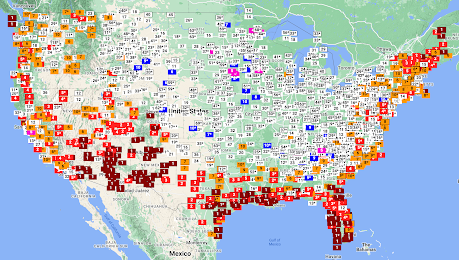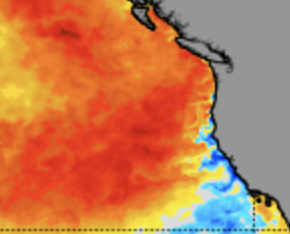July 2023 was a mixed bag regarding temperature across the U.S.
Some locations had their warmest July on record, mainly the Desert Southwest and Gulf of Mexico locations, while others had a relatively cool year (High Plains and Midwest).
But look carefully and you will notice the northwest corner of Washington State also had its warmest July in the historical record (about 50 years). Impressive!
Looking closer you will notice something interesting: although the NW portion of Washington near Quillayute had its warmest July on record, that was not true of the rest of the State. Western Washington was warm (top 10 Julys but not record-breaking), and July temperatures were much more typical east of the Cascades crest and particularly east of the Rockies.
So why was July so unusually warm on the NW coast of Washington? Was the Northwest warmth connected with the warmth over the Desert Southwest?
Let us start by plotting the heights (like pressure) at 500 hPa (about 18,000 ft) averaged over all of July, to see how the large-scale flow pattern for July was unusual. Actually, I have plotted the anomaly from normal (climatology) of the heights at that level (below).
Blue/purple shows below-normal heights (troughing or lows) and warm colors indicate above-normal heights (ridging/high pressure aloft). Ridges, associated with high pressure, are associated with sinking air and warmth.
You will note unusually low pressure/heights over the Pacific and a ridge over the Southwest, which explains the heat there. A BIG trough over the upper Midwest, which explains the cool conditions over the Plains states.
But the 500 heights were not very anomalous over Northwest Washington (slightly above normal).
No explanation for the local extreme warmth in this!
Trying to explain the mysterious Olympic Peninsula warmth in July, I next plotted the difference from normal of average July temperatures at 850 hPa, about 5000 ft above sea level.
The Southwest was much warmer than normal, consistent with persistent high pressure. The northern Plains and upper Midwest were considerably cooler than normal.
But the temperatures aloft over western Washington were NEAR NORMAL.
Why were we so warm and Northwest Washington record-breaking warm if the temperatures near 5000 ft were near normal???
We will need all our Sherlockian skills to figure out this mystery!

Eureka! As Holmes (and Shakespeare) would say, "the game is afoot."
Sea level pressure was lower than normal offshore, higher than normal in western Oregon/Washington, and MUCH higher than normal over southern Alberta.
Normally, higher pressure offshore and lower pressure inland pushes cool marine air into the coast and western Washington. But the pressure pattern observed during July 2023 would weaken the influx of cool air, particularly warming the coast! This pattern also reduces the amount of low clouds off our coast (which eventually move inland), since high pressure aloft favors stratus/stratocumulus.
But there is more. With high pressure inland, there would be the tendency for enhanced offshore-directed (easterly) flow, which would warm farther as it descended the western slopes of the Olympics into the northern Olympic Coast.
And finally, this pressure pattern produces weaker northerly flow along our coast, which tends to cause upwelling of cold water from below (see below, red is above normal). Warmer than normal coastal waters particularly warm coastal zone temperatures.
The bottom line is that an anomalous circulation pattern in the atmosphere created areas of warmer-than-normal and colder-than-normal July temperatures around the nation, with particular effects over NW Washington.
And no, there is no suggestion in theory and observations that such a pattern is provoked by global warming, which contributes to a general increase over the US of about 2F.



.gif)




Thanks for explaining the phenomena that account for natural variations.
ReplyDeleteBut the best guess is that global warming makes each spot in WA 2 degrees warmer than average, right? I don't know the statistical distribution of average July temperatures but I'm guessing that would make an average July (25th warmest in 50 years) become around 15th warmest, 3rd warmest become record-breaking, record-breaking become dramatically record-breaking, etc.
Isn't that important? Especially since global warming is -- unlike natural variation-- (a) increasing and (b) within our control.
Bruce, you say that global warming is increasing and within our control. I have several questions for you:
Delete-- What specifically are your proposed methods and means for controlling global warming? How long would it take for your proposed methods and means to become fully effective in reducing the rate of global warming to zero?
-- Assuming you want to reverse past global warming and to stabilize the earth's global mean temperature to some preferred optimum value, are your proposed methods and means capable of achieving that goal?
Within our control? Who is "our" ? We aren't going to control the world's emissions no matter how many agreements are signed. To believe that some other countries are cutting back is naive.
DeleteMan-made global warming is, by definition, within our control, but you are certainly right to imply that this control is not easy or immediate. Beyond that, I am going to stay on Cliff's topic, which is the role of man-made global warming in this weather phenomenon. If your broader questions about climate action are not rhetorical and you are seriously interested in the answers, you can find a lot of good ones on the internet from respected scientific and policy organizations and media.
DeleteYou didn't respond to my point. The United States contribution to decreasing greenhouse gases is negotiable compared to the output of China and India. We may control some things in this country, compared to the growth around the world, it will have very little impact.
DeleteIt seems as if the term "natural variation" is at odds with the term "Global warming".
ReplyDeleteNot at all. As Cliff has described many times, you can think of the global warming contribution as sort of a curve offset. It's a background effect that superimposes onto the natural variation.
DeleteThat's a bad take. By that standard any human action is natural and thus good (or at least neutral)? Aside from committing the naturalistic fallacy this line of reasoning doesn't hold up to any meaningful scrutiny with respect to climate change and the undeniable signal of human forced warming.
DeleteJohn K, man-made global warming is natural in the same way that death by gunshot is natural. You raise an interesting philosophical point but this is not a practical way of deciding how to live.
DeleteIt seems like the wind is more frequent up here in Everett. It's enough to drive us back into the house about 7pm because it's to chilly. Any insight you can share?
ReplyDeleteHi Cliff, i was driving over the pass this week and shocked at how low the water is at Keechelus lake. I checked the yearly data and seems that we are 60,000 acre feet below average this year. Any insight into why this is the case given a normal-wetter prior winter?
ReplyDeleteSo sad Cliff everyone now goes to "global warming" when no one really listens to rational weather conditions.
ReplyDeleteProf Mass, where do you find climate data for weather sites like the ones you used to compare July temperatures? Is that data available to the general public? Thanks, Bill
ReplyDelete